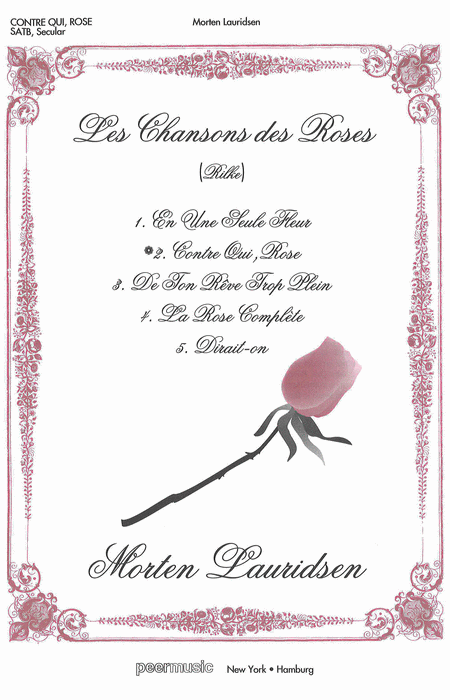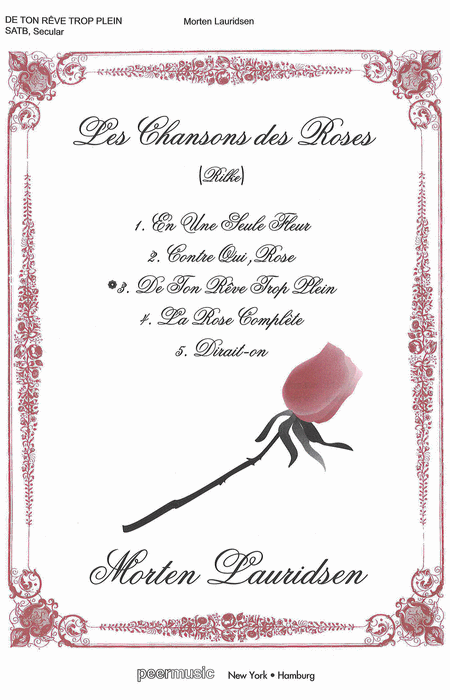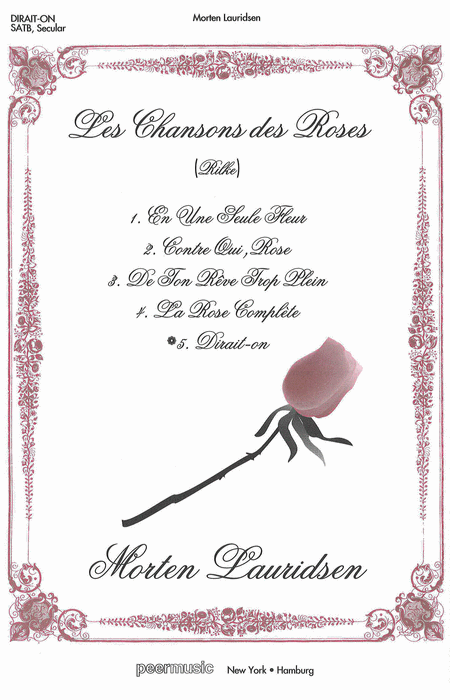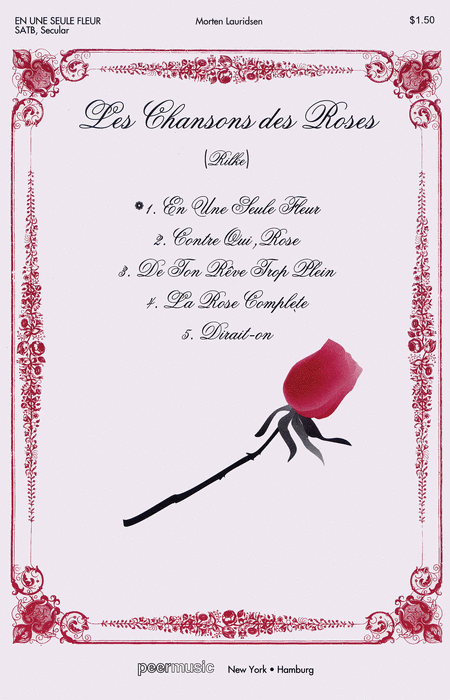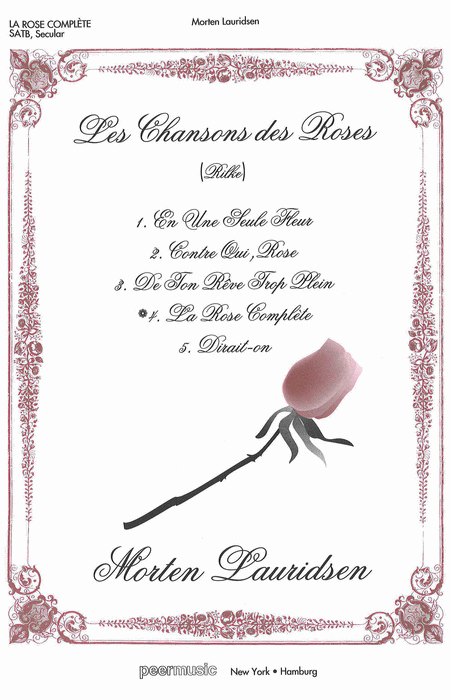In Celebration of the Human Voice - The Essential Musical Instrument
Home | Doo Wop | Barbershop | World | Contemporary | Christian | Vocal Jazz | Choral | Christmas | Instructional | Arrangements
Classical | Opera | Musicals | Personality | Young Singers | Disney | Videos | Songs | The Artists

Sheet Music Series
Les Chansons des Roses
Individual Folios
A Cappella
Displaying 1-5 of 5 items.
In addition to his vast output of German poetry, Rainer Maria Rilke (1875-1926) composed nearly 400 poems in French. His poems on roses struck me as especially charming, filled with gorgeous lyricism, deftly crafted and elegant in their imagery. These exquisite poems are primarily light, joyous and playful, and the musical settings are designed to enhance these characteristics and capture the delicate beauty and sensuousness of the poetry. Distinct melodic and harmonic materials recur throughout the cycle, especially between Rilke's poignant Contre qui, rose (set as a wistful nocturne) and his moving La rose complète. The final piece, Dirait-on, is composed as a tuneful chanson populaire, or folksong, that weaves together two melodic ideas first heard in fragmentary form in preceding movements. --Morten Lauridsen
Arranger: Morten Lauridsen
In addition to his vast output of German poetry, Rainer Maria Rilke (1875-1926) composed nearly 400 poems in French. His poems on roses struck me as especially charming, filled with gorgeous lyricism, deftly crafted and elegant in their imagery. These exquisite poems are primarily light, joyous and playful, and the musical settings are designed to enhance these characteristics and capture the delicate beauty and sensuousness of the poetry. Distinct melodic and harmonic materials recur throughout the cycle, especially between Rilke's poignant Contre qui, rose (set as a wistful nocturne) and his moving La rose complète. The final piece, Dirait-on, is composed as a tuneful chanson populaire, or folksong, that weaves together two melodic ideas first heard in fragmentary form in preceding movements. --Morten Lauridsen
Arranger: Morten Lauridsen
In addition to his vast output of German poetry, Rainer Maria Rilke (1875-1926) composed nearly 400 poems in French. His poems on roses struck me as especially charming, filled with gorgeous lyricism, deftly crafted and elegant in their imagery. These exquisite poems are primarily light, joyous and playful, and the musical settings are designed to enhance these characteristics and capture the delicate beauty and sensuousness of the poetry. Distinct melodic and harmonic materials recur throughout the cycle, especially between Rilke's poignant Contre qui, rose (set as a wistful nocturne) and his moving La rose complète. The final piece, Dirait-on, is composed as a tuneful chanson populaire, or folksong, that weaves together two melodic ideas first heard in fragmentary form in preceding movements. --Morten Lauridsen
Arranger: Morten Lauridsen
In addition to his vast output of German poetry, Rainer Maria Rilke (1875-1926) composed nearly 400 poems in French. His poems on roses struck me as especially charming, filled with gorgeous lyricism, deftly crafted and elegant in their imagery. These exquisite poems are primarily light, joyous and playful, and the musical settings are designed to enhance these characteristics and capture the delicate beauty and sensuousness of the poetry. Distinct melodic and harmonic materials recur throughout the cycle, especially between Rilke's poignant Contre qui, rose (set as a wistful nocturne) and his moving La rose complète. The final piece, Dirait-on, is composed as a tuneful chanson populaire, or folksong, that weaves together two melodic ideas first heard in fragmentary form in preceding movements. --Morten Lauridsen
Arranger: Morten Lauridsen
In addition to his vast output of German poetry, Rainer Maria Rilke (1875-1926) composed nearly 400 poems in French. His poems on roses struck me as especially charming, filled with gorgeous lyricism, deftly crafted and elegant in their imagery. These exquisite poems are primarily light, joyous and playful, and the musical settings are designed to enhance these characteristics and capture the delicate beauty and sensuousness of the poetry. Distinct melodic and harmonic materials recur throughout the cycle, especially between Rilke's poignant Contre qui, rose (set as a wistful nocturne) and his moving La rose complète. The final piece, Dirait-on, is composed as a tuneful chanson populaire, or folksong, that weaves together two melodic ideas first heard in fragmentary form in preceding movements. --Morten Lauridsen
Arranger: Morten Lauridsen
![]() Vocal Harmony Arrangements - Home
Vocal Harmony Arrangements - Home
Christian | Gospel | Standards | Musicals | Specialty | World | Barbershop | Contemporary | Vocal Jazz | Choral | Christmas
Mixed Voices | Female | Male | 8 Parts | 6 Parts | 5 Parts | 3 Parts | 2 Parts | Medleys | Solo | Folio Series | New Releases
Select a Category |
Want to Sing? - Find a Chorus Near You
List of Choruses by State | List of Choruses by City

